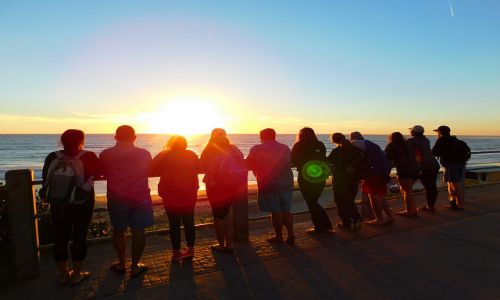Break trips teach human solidarity through challenges

Break trips teach human solidarity through challenges
October 31, 2017
Since I was almost totally alone while waiting to get picked up for my break trip group’s dinner, I was left with time to think. What were my expectations? I knew that Exmore, Virginia was a rural place on the Eastern Shore with a high concentration of low income people. I knew I’d be spending most of the week working with Habitat for Humanity, an organization I had never volunteered with before. Despite the fact that at my meetings prior to the trip they encouraged us to look for similarities between ourselves and the people of Exmore, I expected my trip to be full of difference. I anticipated a contrast between myself and people from Exmore because of our different backgrounds, hometowns and lives in general. I thought the difference would be refreshing and expand my perspectives and knowledge. I became excited to learn and grow from this. However, the connection I noticed between my break trip group and people from Exmore was astonishing, which proved to be even more eye-opening than any of our differences could.
On the second day of my trip to Exmore, my group attended a worship service in the church in which we were staying. The pastor, Rob, was talking about human suffering and noted that everyone has a “rough side of the mountain.” He reminded us that we do not always know what someone’s rough side of the mountain is or when they are climbing it, and he emphasized the importance of continuing to climb. Pastor Rob urged everyone, “Don’t give up five minutes before the miracle.”
In the middle of the week, while my group was reflecting before going to sleep, it occurred to me that everyone has a “rough side of the mountain.” For example, the families who were going to live in the Habitat homes my group worked on had been affected by poverty and were diligently working to help construct their future homes. For these families and for many of those experiencing poverty, the rough side of the mountain is external and difficult to hide. People tend to view them as “other” and take pity on them simply because their struggles are visible. However, I believe that anyone without a visible rough side of the mountain experiences an invisible rough side of the mountain at some point. Whether it is a hidden challenge, emotional distress or internal battle kept to oneself, everyone endures challenging times. Just because we cannot see these as easily as struggles like poverty does not mean that we have to create a divide in this area. We can find human solidarity in knowing that at some point in time, in some way, whether visible or invisible, everyone has a “rough side of the mountain.” We are all human, and though it is expressed in different forms, we are all united in the fact that we experience challenges that we have to fight to overcome.
My break trip to Exmore, Virginia changed me because I no longer feel that there is a great difference between myself and those dealing with poverty. All people are united in the fact that we struggle and that we are called to lift one another up however we can. Virtually all college students are vulnerable to falling into a trap of categorizing ourselves as one group and categorizing those in poverty as another. This results in the vision that those struggling with poverty are starkly different. It is vital to fight back against this mindset and to find similarities when possible to create a spirit of unity and friendship. Division occurs when one group views another as beneath itself in any way. Seemingly small actions and choices can begin to combat this problem. For example, when doing service, speak to those you are serving just as you would any other person, without pity or belittling, however unintentional. When making voting decisions, consider the idea of human solidarity. Reflect on how policies will affect others, even if something may not have a directly negative impact on you. No one should climb their rough side of the mountain alone.

